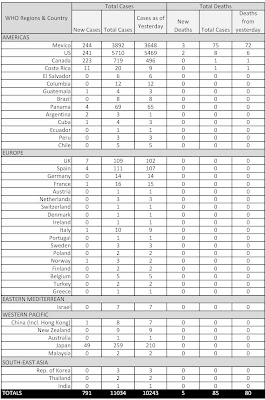The WHO Pandemic Alert level remains at Phase 5.
Influenza A (H1N1) Cases and Deaths by Country (as of 8 AM PST May 21st)
*Lab confirmed cases and deaths have been provided by the WHO’s Influenza A (H1N1) – Update #35.
Local/National News
- On May 20th, the Public Health Agency of Canada (PHAC) announced that 223 new cases of Influenza A (H1N1) had been confirmed in the country (PHAC had not released any revised case totals since May 15th). Ontario still has the most cases in Canada (284), followed by British Columbia (114), Quebec (106), Alberta (86), Nova Scotia (68), Saskatchewan (49), Manitoba (6), PEI (3), New Brunswick (2), and the Yukon (1). Canada’s total case count is now at 719 with 16 hospitalizations and one death.
- The British Columbia Centre for Disease Control (BCCDC) now reports the following confirmed cases across the province:
- 43 in Fraser Health
- 3 in Interior Health
- 22 in Northern Health
- 31 in Vancouver Coastal Health
- 15 in Vancouver Island Health
International News
- A recent survey found that more than half (55%) of global companies belonging to the Conference Board had activated pandemic response plans because of the H1N1 epidemic. The survey covered 121 members of the Conference Board, a global nonprofit association of businesses. Almost all the companies said they were making special efforts to provide pandemic information to employees, and 81% said they have encouraged workers who feel sick to stay home. Medical News Today
- New York City health officials said a 16-month-old boy who died May 18 of suspected H1N1 flu tested negative for the virus. Meanwhile, City Health Commissioner Thomas Frieden recommended closing three more schools as of today because of high rates of flu-like illness, bringing the number of closed schools in the city to 21. AP report
- At yesterday’s U.S. Centers for Disease Control (CDC) press conference, Dr. Dan Jernigan announced the following information about the US case load:
- 78%, of the viruses that have been collected through the surveillance systems in the United States are the novel H1N1 influenza.
- There are 247 individuals that have been hospitalized and over 70% of those hospitalized patients have had underlying chronic medical conditions, including pregnancy.
- Asthma and heart disease are the most common underlying chronic medical conditions.
Vaccine News
- If US officials decide to launch an H1N1 immunization campaign later this year, seasonal flu vaccination efforts may start earlier than usual. Dr. Dan Jernigan said the CDC estimates that an H1N1 vaccine will become available sometime in the fall. "If possible, we do want to have earlier rollout of seasonal vaccine simply for that reason, to make it easier for an additional vaccine if that is the ultimate policy". CDC briefing transcript
Latest Guidance from the WHO, U.S. CDC, PHAC, and BCCDC
- Yesterday, the CDC released translated versions (Arabic, French, Russian and Simplified Chinese) of several guidance documents for the general public. CDC
Today’s Key Question
Is influenza A (H1N1) directing attention away from more important diseases?
According to some, due to fears that Influenza A (H1N1) may evolve into the next pandemic, many other diseases are being neglected at this year’s World Health Assembly. Discussions regarding Chagas disease, cancer and diabetes, hepatitis, were either dropped or postponed, to the outrage of many health officials. Moreover, according to Dr. Sam Zaramba, Uganda’s chief medical officer, “If all the emphasis that has been put on swine flu had been put on malaria and TB, we would have made a bigger impact on health.”
However, a World Health Organization (WHO) spokesperson, Thomas Abraham asserted that certain issues had to be dropped or deferred when the member nations decided to shorten the meeting as their ministers were needed at home to help prepare against a possible pandemic. “H1N1 influenza is not taking up the major portion of discussions…and just because a topic is not discussed here does not mean WHO programs are going to stop,” said Abraham.
Since April, influenza A (H1N1) has contributed to the deaths of 80 people while infecting more than 10,000.




